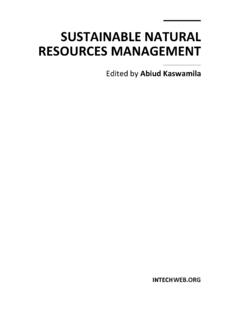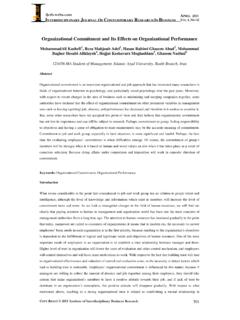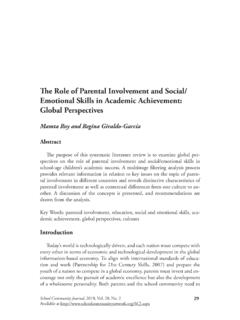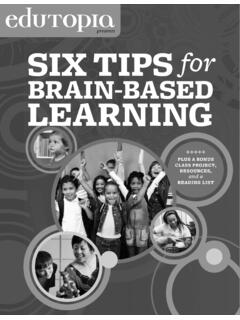Transcription of EMOTIONAL INTELLIGENCE – NEW PERSPECTIVES AND …
1 EMOTIONAL INTELLIGENCE NEW PERSPECTIVES AND APPLICATIONS Edited by Annamaria Di Fabio EMOTIONAL INTELLIGENCE New PERSPECTIVES and Applications Edited by Annamaria Di Fabio Published by InTech Janeza Trdine 9, 51000 Rijeka, Croatia Copyright 2011 InTech All chapters are Open Access distributed under the Creative Commons Attribution license, which allows users to download, copy and build upon published articles even for commercial purposes, as long as the author and publisher are properly credited, which ensures maximum dissemination and a wider impact of our publications. After this work has been published by InTech, authors have the right to republish it, in whole or part, in any publication of which they are the author, and to make other personal use of the work. Any republication, referencing or personal use of the work must explicitly identify the original source.
2 As for readers, this license allows users to download, copy and build upon published chapters even for commercial purposes, as long as the author and publisher are properly credited, which ensures maximum dissemination and a wider impact of our publications. Notice Statements and opinions expressed in the chapters are these of the individual contributors and not necessarily those of the editors or publisher. No responsibility is accepted for the accuracy of information contained in the published chapters. The publisher assumes no responsibility for any damage or injury to persons or property arising out of the use of any materials, instructions, methods or ideas contained in the book. Publishing Process Manager Ivana Zec Technical Editor Teodora Smiljanic Cover Designer InTech Design Team First published January, 2012 Printed in Croatia A free online edition of this book is available at Additional hard copies can be obtained from EMOTIONAL INTELLIGENCE New PERSPECTIVES and Applications, Edited by Annamaria Di Fabio p.
3 Cm. ISBN 978-953-307-838-0 free online editions of InTech Books and Journals can be found Contents Preface IX Part 1 EMOTIONAL INTELLIGENCE : Theory, Research and Future PERSPECTIVES 1 Chapter 1 EMOTIONAL INTELLIGENCE 3 Adrian Furnham Chapter 2 The Impact of EMOTIONAL INTELLIGENCE on Health and Wellbeing 29 Reuven Bar-On Chapter 3 EMOTIONAL INTELLIGENCE : A New Variable in Career Decision-Making 51 Annamaria Di Fabio Chapter 4 Clinical PERSPECTIVES in EMOTIONAL INTELLIGENCE 67 Michel Hansenne Chapter 5 A Meta-Analytic Review of Quantitative Studies on EMOTIONAL INTELLIGENCE and Leadership 83 Hui-Wen Vivian Tang and Mu-Shang Yin Chapter 6 EMOTIONAL INTELLIGENCE and Leadership A Case for Quality Assurance Managers in Kenyan Universities 99 Laban Peter Ayiro and James K. Sang Chapter 7 EMOTIONAL INTELLIGENCE : The Most Potent Factor of Job Performance Among Executives 121 Reza Gharoie Ahangar Chapter 8 Positive Human Tacit Signal Approach and Competence System INTELLIGENCE in Organization 139 Antti Syv j rvi and Marko Kesti VI Contents Chapter 9 Maternal Attitudes, EMOTIONAL INTELLIGENCE and Home Environment and Their Relations with EMOTIONAL INTELLIGENCE of Sixth Years Old Children 167 Ilkay Ulutas and Esra Omeroglu Part 2 EMOTIONAL INTELLIGENCE : Assessment and Training 181 Chapter 10 The Equivalence of Online and Paper-Pencil Measures of EMOTIONAL INTELLIGENCE 183 Barbara B.
4 Meyer, Susan E. Cashin and William V. Massey Chapter 11 Development of a Chinese EMOTIONAL INTELLIGENCE Inventory and Its Association with Physical Activity 195 Gladys Shuk-fong Li, Wei Ting Li and Hsiu Hua Wang Chapter 12 Assessing EMOTIONAL INTELLIGENCE and Its Impact in Caring Professions: The Value of a Mixed-Methods Approach in EMOTIONAL INTELLIGENCE Work with Teachers 215 Roisin P. Corcoran and Roland Tormey Chapter 13 Developing EMOTIONAL INTELLIGENCE for Healthcare Leaders 239 Claudia S. P. Fernandez, Herbert B. Peterson, Shelly W. Holmstr m and AnnaMarie Connolly Chapter 14 Thinking Skill of EMOTIONAL INTELLIGENCE Education Programme 261 M ge Y lmaz Chapter 15 How to Influence the New Technologies in the EMOTIONAL INTELLIGENCE and Communication of Higher Education Student 279 Carmen Maria Salvador Ferrer Preface EMOTIONAL INTELLIGENCE is an emerging construct for applied research and possible interventions, both in scholastic, academic and educational contexts, organizational contexts, as well as at an individual level in terms of people s well-being and life satisfaction.
5 Whereas more traditional individual psychological variables like personality traits are substantially stable (Costa & McCrae, 1992), EMOTIONAL INTELLIGENCE seems to be a variable that can be increased through specially realized training (Di Fabio & Kenny, 2011; Mayer & Salovey, 1997). This volume contains contributions by international scholars who have, with their work, provided significant PERSPECTIVES for further research and application related to the construct of EMOTIONAL INTELLIGENCE . Regarding its organization, the book is divided into two sections: the first section deals with the theory, research and future PERSPECTIVES offered by the construct of EMOTIONAL INTELLIGENCE , whereas the second section presents the issues relative to the assessment of EMOTIONAL INTELLIGENCE and possibilities to increase this variable through specific trainings.
6 The first section of the volume begins with a contribution from Adrian Furnham, which offers a presentation of the EMOTIONAL INTELLIGENCE construct, studying the measurement tools in depth and outlining the role of EMOTIONAL INTELLIGENCE in the work context. The second contribution, by Reuven Bar-On, opens the reflection on the many areas of research and application of the construct of EMOTIONAL INTELLIGENCE . The author examines the impact of EMOTIONAL INTELLIGENCE on health and well-being, emphasizing the importance of EMOTIONAL INTELLIGENCE in parenting, education and healthcare in particular. The following contribution, by Annamaria Di Fabio, introduces EMOTIONAL INTELLIGENCE as an innovative variable in the career decision-making process, presenting current researches, which linked EMOTIONAL INTELLIGENCE with different decisional aspects X Preface (career decision-making difficulties, decisional styles and indecisiveness), and underlining new promising PERSPECTIVES for research and intervention in this field.
7 The fourth contribution, by Michel Hansenne, focuses on the perspective that the construct of EMOTIONAL INTELLIGENCE can offer in a clinical field, showing the relations of this construct with well-being, depression, anxiety, and highlighting the potential of EMOTIONAL INTELLIGENCE in terms of interventions, which is possible to realize. The following chapter by Hui-Wen Vivian Tang offers a systematic review of the literature relative to the relations between EMOTIONAL INTELLIGENCE and leadership, opening a core of contributions about the role of EMOTIONAL INTELLIGENCE in organizations. The chapter by Laban Ayiro and James Sang presents a study on Quality Assurance Managers in Kenyan universities, showing the links between EMOTIONAL INTELLIGENCE and leadership, and highlighting possible implications of EMOTIONAL INTELLIGENCE for human research development research and practice.
8 The chapter by Reza Gharoie Ahangar shows in particular a study for analyzing the effect of EMOTIONAL INTELLIGENCE on the work performance of executives, underlining the role of EMOTIONAL INTELLIGENCE in work performance as a factor for success in organizations. The following chapter, by Marko Kesti and Antti Syv j rvi, describes the importance of the positive human tacit signals in EMOTIONAL INTELLIGENCE domain, and shows the application of the Competence System INTELLIGENCE in relation to EMOTIONAL INTELLIGENCE in organizational field, offering possible implications for research and intervention. The chapter by Ilkay Ulutas and Era Omeroglu closes the first section of the volume and it describes a study relative to the influence of maternal factors, that is maternal attitudes, EMOTIONAL INTELLIGENCE and home environment, on EMOTIONAL INTELLIGENCE of children in Turkey, showing how mothers EMOTIONAL INTELLIGENCE is related to the EMOTIONAL INTELLIGENCE of their children, and also opening new PERSPECTIVES for research in the educational field.
9 After presenting the promising role of EMOTIONAL INTELLIGENCE construct in several fields, the second section is relative to the assessment and trainings for increasing EMOTIONAL INTELLIGENCE , even in a framework that characterizes the contributions in a wide ranging international perspective. The chapter by Barbara B. Meyer, Susan E. Cashin, and William V. Massey opens the second section and describes a study on the equivalence of online and paper-pencil measure of EMOTIONAL INTELLIGENCE , offering interesting stimuli for reflection on the advantages and disadvantages of using online measures for the assessment of EMOTIONAL INTELLIGENCE . Preface XI The second contribution, by Gladys Shuk-fong Li, Wei Ting Li, and Hsiu Hua Wang offers the development of the Chinese EMOTIONAL INTELLIGENCE Inventory and analyzes the possible links between EMOTIONAL INTELLIGENCE and physical activity, underlining the interest in assessing EMOTIONAL INTELLIGENCE in different contexts.
10 The following chapter, by Roisin P. Corcoran and Roland Tormey, introduces a reflection on the potentialities of an integrated use of a qualitative and quantitative assessment of EMOTIONAL INTELLIGENCE , referring to the caring professions in particular. The chapter by Claudia Fernandez, Herbert Bs. Peterson, Shelly W. Holmstom and AnnaMarie Connolly describes a training on EMOTIONAL INTELLIGENCE specifically realized for health care leaders, identifying EMOTIONAL INTELLIGENCE as a core competency to engage and motivate working groups. The following contribution by Muge Yilmaz also offers a training for increasing EMOTIONAL INTELLIGENCE , the Thinking Skill of EMOTIONAL INTELLIGENCE Education Programme, describing its objectives and articulation in detail, and showing the results that demonstrate its effectiveness.













